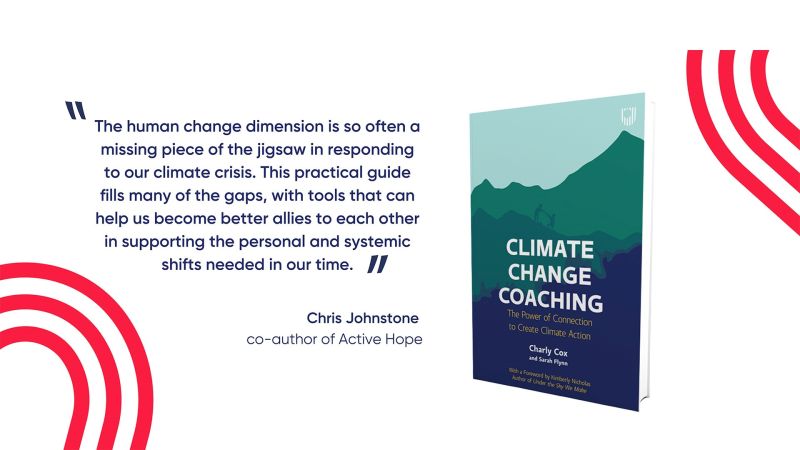
Coaching for climate change
By Livvy Drake
As someone who has committed my work to addressing the problems of climate and environment because I love nature and people, seeing it unfold faster than predicted is heart-wrenching.
I can see on social media that others are feeling the same helplessness, hopelessness, anger and rage. And exhibiting it in a range of different communication styles from; sharing the stats and facts, pictures comparing 1976 heatwave to now and also some ‘Wake up and smell the burning grass, we told you so approaches’.
Before I put anything down on screen I referred back to a recent reference book I have bought from the the brilliant climate change coaches.
This new book: Climate Change Coaching – the power of connection to create climate action is designed to be a desk-top companion for sustainability professionals, campaigners and coaches, in how to engage other people and support themselves as we navigate the impacts and realities of climate action and inaction around us.

Making sense of other people´s reactions
The book helps to make sense of the denial, ‘head in the sand’ and references to 1976 heatwaves that has been observed when the UK’s temperatures broke all known records.

When our systems are threatened, people often experience reactance. They may try to defend the status quo and resist the possibility of change or deny the problem altogether by dismissing it and blaming the messenger


We need to focus on the solutions, not the problem. While threat and fear are debilitating, solutions can foster a sense of efficacy, empowerment and hope especially when it is in connection with other people

Why empowering people trumps scaring people
It can be tempting, and I know I have done it, to think that shocking people with stats and facts and horrific images will spur them into action. But psychology shows that in fact it can have the opposite effect, as highlighted by the Climate Coaches.
And there are more pearls of wisdom
The above is just some extracts from the first few pages and a talk I attended. The book also contains practical tools for:
- How to help organisations commit to change
- Supporting and coaching ourselves to avoid burnout
- Loving, grieving and hoping
Sure reading a book isn’t going to cool the heat or change Governments’ inaction. But it can help to address how we respond and how we engage with others. And after all the key is that the old ways haven’t worked, so we need to try something different.



